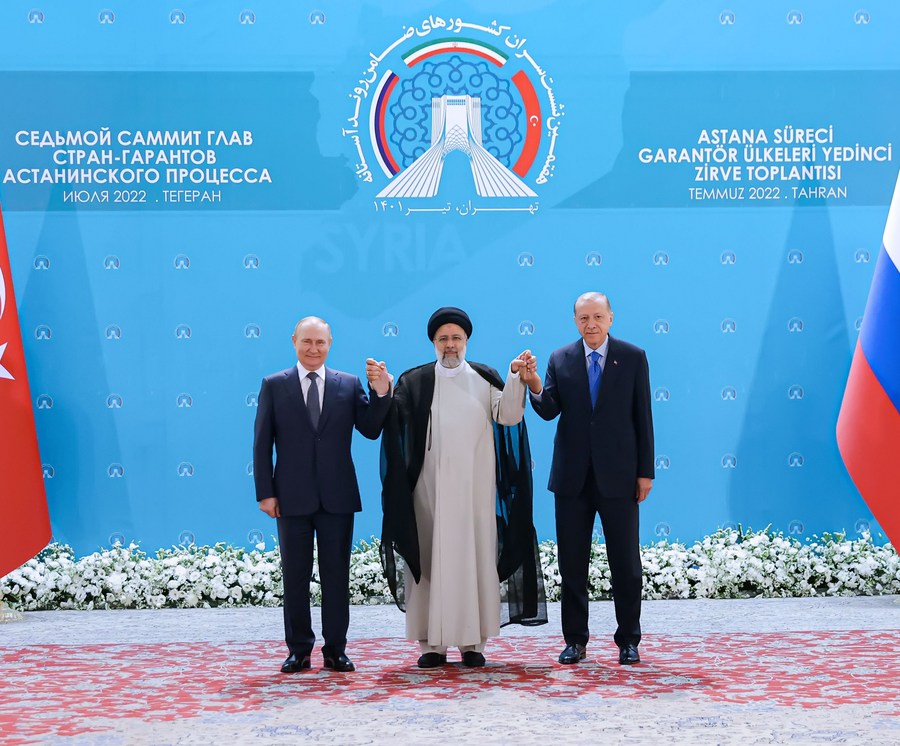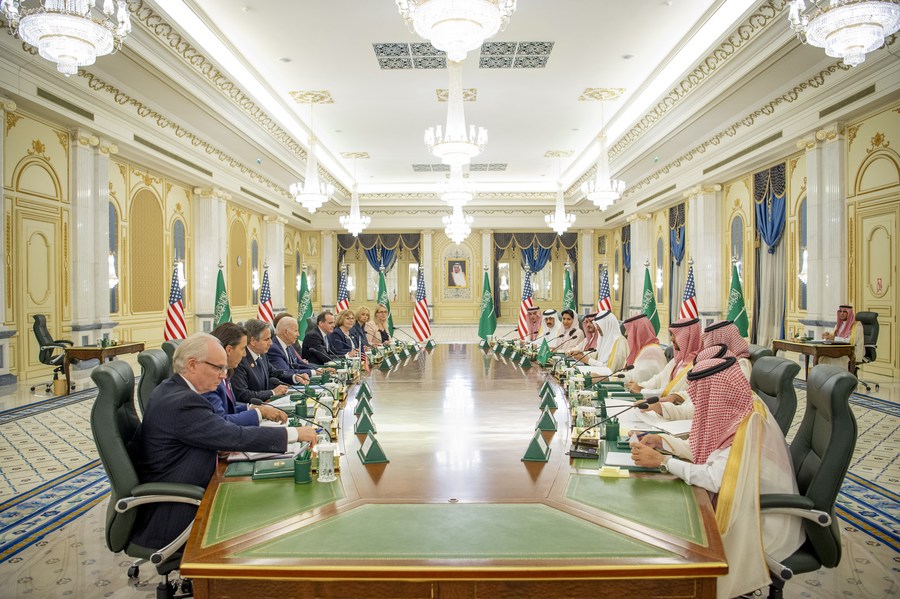TEHRAN, July 30 (Xinhua) — Days after U.S. President Joe Biden wrapped up his first Middle East tour aimed at rallying support, a host of regional developments has taken place in the region, demonstrating regional countries’ eager pursuit of strategic autonomy and their weariness of U.S. interference.
Following Biden’s visit, Turkish President Recep Tayyip Erdogan visited Iran together with Russian President Vladimir Putin; President of the United Arab Emirates (UAE) Sheikh Mohamed bin Zayed Al Nahyan chose Paris, instead of Washington, as the destination of his first overseas state visit, while Tehran and Riyadh have agreed to hold their public reconciliation talks.
Analysts say behind these moves is a shared quest for development and security by regional countries, as they seek to take back into their own hands the strategic autonomy long overshadowed by the U.S. influence.
RELUCTANCE TO TAKE SIDES
As the Ukraine crisis keeps escalating, most Middle Eastern countries have declined to join the “anti-Russian camp” led by the United States, highlighting the split between them. For instance, the UAE in February abstained from voting in favor of a U.S.-backed resolution to condemn Russia at the United Nations Security Council.
On the energy issue, the United States and Britain have been urging oil-rich countries in the Middle East to increase petroleum production in order to lower oil prices and ease their energy crisis, thereby creating policy space to further pressure Russia.
However, Saudi Arabia and other Gulf countries have not shown much interest in cooperating with the United States on oil matters as such a move undermines their national interests. Riyadh has repeatedly said the kingdom’s oil production will not be increased until an agreement is reached with its partners in OPEC+ during their next meeting in August.
Middle Eastern countries have shown “more and more confidence in the face of world powers,” wrote Fan Hongda, a professor at the Middle East Studies Institute of Shanghai International Studies University in China, adding that traditional energy powers in the Middle East “are rapidly recovering” and letting their voices be heard on the international stage.
WIND OF RECONCILIATION
Biden’s first Middle East tour meant to rally support to counter what he called “Iranian threats,” but the actual achievement is at best watered-down. Though Washington has been pumping up Iran’s threat, Iraq said recently it will host a “public” meeting between Iran and Saudi Arabia at the level of foreign ministers as part of successive reconciliation talks mediated by Baghdad.

Iranian President Ebrahim Raisi (C), Russian President Vladimir Putin (L) and Turkish President Recep Tayyip Erdogan pose for a photo ahead of a trilateral meeting on the situation in Syria, in Tehran, Iran, on July 19, 2022. (Iranian Presidential Website/Handout via Xinhua)
Such a possible thaw in Iran-Saudi Arabia relations is part of a wider reconciliation drive in the region as countries such as Türkiye, Saudi Arabia, the UAE and Egypt have also been adjusting their foreign policies and patching up their relations after years of antagonism.
For long, the United States has been trying to consolidate its regional influence through provoking bloc confrontation, and taken advantage of strained ties among regional countries to interfere, but this has been widely recognized by Middle Eastern countries as being against the interests of the region, politicians and analysts say.
“Dialogue is the best policy to address the existing tensions,” Jordan’s Foreign Minister Ayman Safadi said recently, adding that “the region has enough crises, and we do not need more tensions.”
In parallel to reducing tensions, development grows “increasingly important” on the national agenda of Middle Eastern countries, and regional countries have been strengthening cooperation with each other to achieve development, Fan said.
“AWAKENING MIDDLE EAST”
Biden, speaking at a summit with Arab leaders as part of his recent trip, said that the United States “will not walk away” from the Middle East and leave a so-called “vacuum” to be filled by other major countries.

U.S. President Joe Biden participates in a working session with Saudi Crown Prince Mohammed bin Salman Al Saud at the Al-Salam Palace in Jeddah, Saudi Arabia, July 15, 2022. (Saudi Press Agency/Handout via Xinhua)
Yet, such a remark by Biden mirrors “serious problems with the current perception of the Middle East in the United States,” and “the constantly awakening Middle Eastern countries are consciously getting rid of or reducing the influence of world powers on the region,” Fan said.
The Middle East is being reshaped, and this process features greater role by countries within the region, said Fan.
Meanwhile, the Middle East’s oil-rich economies, to gain autonomy, have tried to diversify their economies and reduce their reliance on hydrocarbons in recent years, so as to enhance their ability to withstand risks.
“Foreign powers have a deep economic, political and military footprint in the region. An economically independent Middle East can challenge the established patterns of external hegemony and undermine the prolonged legacy of divide and rule,” Adeel Malik, an economy researcher at the University of Oxford, wrote. ■













